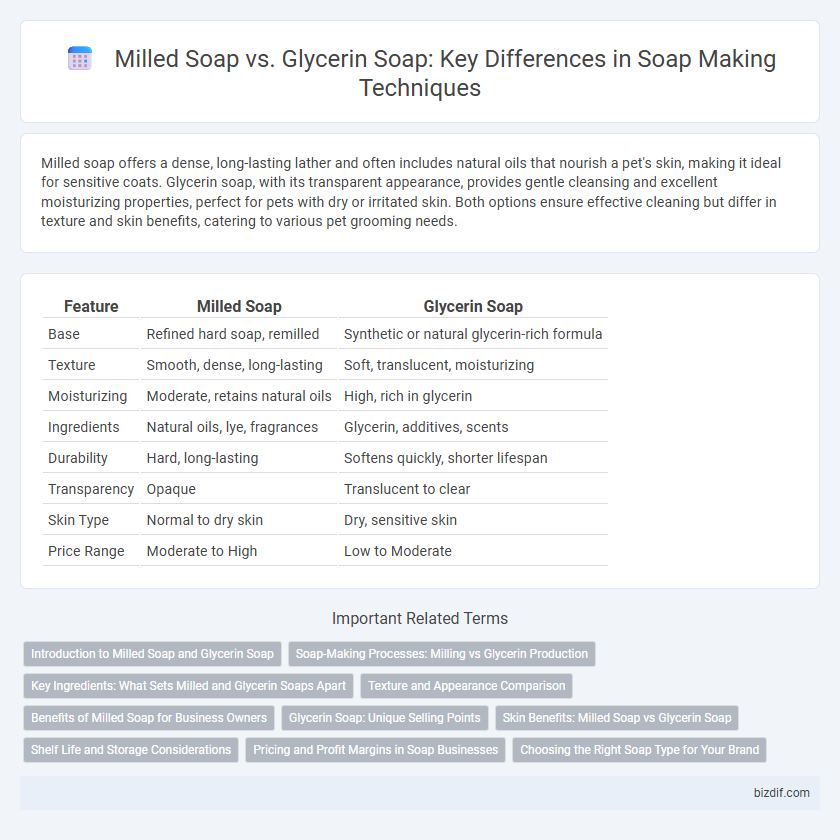Milled soap offers a dense, long-lasting lather and often includes natural oils that nourish a pet's skin, making it ideal for sensitive coats. Glycerin soap, with its transparent appearance, provides gentle cleansing and excellent moisturizing properties, perfect for pets with dry or irritated skin. Both options ensure effective cleaning but differ in texture and skin benefits, catering to various pet grooming needs.
Table of Comparison
| Feature | Milled Soap | Glycerin Soap |
|---|---|---|
| Base | Refined hard soap, remilled | Synthetic or natural glycerin-rich formula |
| Texture | Smooth, dense, long-lasting | Soft, translucent, moisturizing |
| Moisturizing | Moderate, retains natural oils | High, rich in glycerin |
| Ingredients | Natural oils, lye, fragrances | Glycerin, additives, scents |
| Durability | Hard, long-lasting | Softens quickly, shorter lifespan |
| Transparency | Opaque | Translucent to clear |
| Skin Type | Normal to dry skin | Dry, sensitive skin |
| Price Range | Moderate to High | Low to Moderate |
Introduction to Milled Soap and Glycerin Soap
Milled soap, also known as triple-milled soap, undergoes a process where the soap is passed through stainless steel rollers multiple times to ensure a dense, smooth texture and longer-lasting bar. Glycerin soap contains high levels of glycerin, a natural humectant that attracts moisture, making it ideal for sensitive and dry skin due to its gentle, moisturizing properties. Both milled and glycerin soaps offer unique benefits, with milled soap providing durability and luxury, while glycerin soap provides hydration and clarity.
Soap-Making Processes: Milling vs Glycerin Production
Milled soap undergoes a rigorous process involving grinding, warming, and re-rolling to create a dense, smooth bar with enhanced longevity and lather quality, while glycerin soap is produced through a melt-and-pour method that preserves glycerin content for moisturizing properties. Milling removes excess water and impurities through extraction and repeated refining, resulting in a hard, long-lasting soap ideal for sensitive skin. Glycerin soap manufacturing emphasizes transparency and hydration by incorporating glycerin-rich bases, offering gentle cleansing with a translucent appearance.
Key Ingredients: What Sets Milled and Glycerin Soaps Apart
Milled soap is crafted from a dense blend of oils such as coconut, olive, and palm, combined with lye to undergo a saponification process that creates a long-lasting, hard bar with rich lather. Glycerin soap is formulated with a high concentration of glycerin, a humectant that attracts moisture, often combined with vegetable oils and additives like colorants or fragrances, resulting in a transparent, moisturizing bar. The primary distinction lies in the milled soap's emphasis on saponified oils for durability, whereas glycerin soap highlights glycerin content for hydration and transparency.
Texture and Appearance Comparison
Milled soap features a dense, creamy texture with a smooth, matte finish due to its triple-milled process that removes impurities and excess moisture. Glycerin soap boasts a translucent, glossy appearance and a softer, more pliable texture, making it gentle on the skin but less durable than milled soap. The choice between milled and glycerin soap depends on preference for a firm, long-lasting bar versus a moisturizing, visually appealing option.
Benefits of Milled Soap for Business Owners
Milled soap offers business owners higher quality and consistency due to its fine, dense texture that results from the reprocessing of soap bars, ensuring longer-lasting products that enhance customer satisfaction. This type of soap presents improved lather and durability, reducing product waste and increasing cost-effectiveness for retailers. Additionally, milled soap's premium appearance and scent retention boost brand perception, helping businesses attract and retain loyal customers in competitive markets.
Glycerin Soap: Unique Selling Points
Glycerin soap stands out for its exceptional moisturizing properties due to its high glycerin content, which attracts and retains moisture in the skin. Its transparency and gentle formulation make it ideal for sensitive skin and allow for a variety of customizations with natural additives and fragrances. Unlike milled soap, glycerin soap dissolves easily, providing a smooth, hydrating cleanse without stripping the skin's natural oils.
Skin Benefits: Milled Soap vs Glycerin Soap
Milled soap, made through a process of triple milling, offers dense lather and increased moisturizing properties due to its concentrated glycerin content, making it highly beneficial for dry or sensitive skin. Glycerin soap, known for its natural humectant qualities, attracts moisture to the skin's surface, promoting hydration and soothing irritation, ideal for those prone to eczema or dermatitis. Both types provide gentle cleansing, but milled soap's long-lasting formulation enhances skin nourishment, while glycerin soap's transparency ensures purity and minimal additives.
Shelf Life and Storage Considerations
Milled soap, known for its dense, hard texture, typically has a longer shelf life of up to two years due to its low moisture content and natural ingredients, making it less prone to oxidation and bacterial growth. Glycerin soap, with a higher moisture content, tends to absorb water from the environment, which can shorten its shelf life to about six months unless stored in a cool, dry place with airtight packaging. Proper storage for both soap types involves keeping them away from direct sunlight and humidity to maintain their fragrance, texture, and cleansing properties.
Pricing and Profit Margins in Soap Businesses
Milled soap typically commands higher prices due to its dense, long-lasting quality and superior texture, allowing soap businesses to achieve better profit margins despite higher production costs. Glycerin soap often sells at lower prices because of its translucent appearance and moisturizing properties, attracting budget-conscious customers but yielding slimmer profit margins. Understanding these pricing dynamics helps soap makers strategically position their products to maximize revenue and market appeal.
Choosing the Right Soap Type for Your Brand
Milled soap offers a dense, long-lasting bar with a smooth texture, ideal for luxury or artisanal brands seeking a premium product with superior lather and durability. Glycerin soap is transparent, moisturizing, and gentle on the skin, perfect for brands targeting sensitive skin or offering visually appealing, customizable bars. Selecting between milled and glycerin soap depends on your brand's focus on longevity, aesthetic appeal, and skin benefits.
Milled Soap vs Glycerin Soap Infographic

 bizdif.com
bizdif.com